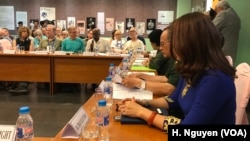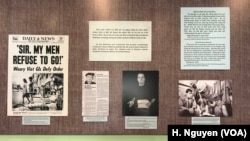As part of Vietnam’s 50th anniversary commemorations of the Tet Offensive, Americans who opposed the war, including military veterans, have met with those who fought on the other side of the battlefield.
The women and men gathered in Ho Chi Minh City Tuesday at the War Remnants Museum, which tells the story of the war from the viewpoint of the communist government.
The Vietnamese and Americans are uniting this week amid a bevy of war commemorations. It has been half a century since the Tet Offensive, a campaign of surprise attacks against military and civilian command and control centers throughout South Vietnam, and the My Lai Massacre, in which hundreds of civilians were killed by U.S. soldiers.
Many of the Americans in attendance had found diverse ways to register their opposition to the war, from refusing the draft, to going AWOL after they had shipped out to Vietnam. Decades later some of them came to the communist country for the first time since the war.
They are on what they call a peace tour, with a ceremonial stopover in the My Lai hamlet. Around Vietnam there have been street posters and book displays recalling the Tet Offensive, as well as a screening and filmmaker discussion of the “The Whistle Blower of My Lai.”
Struggles with war
Before sitting down for a lunch of Vietnamese crepes and hotpot, the U.S. visitors described their own struggles with the war.
Mike Southerland deployed to Vietnam but eventually defected to Sweden. Judy Olasov set up underground cafes for conscientious objectors, bringing together blacks and whites, soldiers and students. J.J. Johnson enlisted in the military but was jailed after refusing to go to Vietnam.
“The courage and the leadership of the Vietnamese people inspired those of us inside and outside the military,” said Johnson, who was also inspired by the war objections of Martin Luther King Jr. and Muhammad Ali. “We felt if a relatively small nation without the technology, firepower and resources of the most powerful nation on the globe can overcome, perhaps we can, too.”
Wounds fresh
“The war ended 40 years ago, but the wounds of war are still bleeding,” said Phan Thi Ngoc Tuoi, who was a colonel in the Vietnamese special forces.
She spoke about the pain of losing family members in the bloodshed, as well as about her conviction at the time that force was the only option to end the violence.
“I love peace, so I took up arms to fight,” she said at a morning roundtable before breaking bread with two dozen U.S. veterans over lunch.
The roundtable discussion kicked off an exhibit that will remain at the museum until April 15, titled “Waging Peace: U.S. Soldiers and Veterans Who Opposed America’s War in Vietnam.”
“In the resistance war of Vietnamese people, it was all the more absurd that we had to fight against the professional war machine of America,” said Dong Anh Kiet, a member of a local veterans association. But he acknowledged that both sides suffered, describing American mothers who could sympathize with the loss that Vietnamese mothers also underwent.
Chuck Searcy, a Hanoi-based leader of a local chapter of the Veterans For Peace group, co-organized the gathering with Ton Nu Thi Ninh, a former Vietnamese diplomat and the president of the Ho Chi Minh City Peace and Development Foundation.









